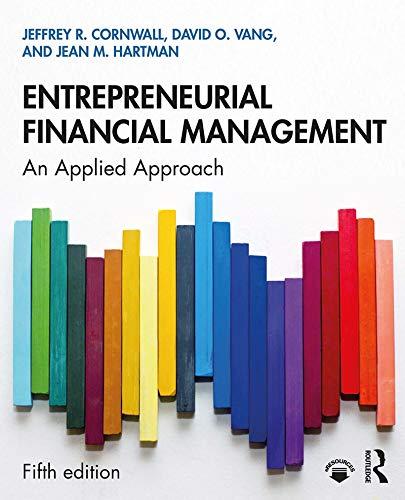Question
The basic setup for all questions begins the same. Frederica Johnson has been offered the position as CIO of a large public technology company. As
The basic setup for all questions begins the same. Frederica Johnson has been offered the position as CIO of a large public technology company. As part of the deal, Frederica has been offered employee stock options in the company. The details of the option offer is as follows:
- The package is for 250,000 options over the companys stock
- The strike price of each options has been set at $120 that is the current stock price of the company meaning the options have been priced at-the-money
- The options are European and mature in 5 years
- For the purpose of this questions, the annualized volatility of the companys stock has been estimated at 30%
- The company does not pay a dividend and is not expected to over the next five years
- An appropriate annualized risk-free rate is 1.0% (professors current favorite
- Question 1: Using the Black-Scholes model, what is each option worth today, and what are they worth in total? (Professor note: I know this is not much of a challenge since I have given you an options pricing spreadsheet but this at least shows me you know the values to use and how to calculate the answer).
-
Question 2: Use a binomial tree approach to value the same options please use years as the basic unit of time, meaning your tree should contain 5 steps. To assist in the organization of your answer, I have broken the question into the following parts:
-
a) What are the up and down factors for constructing the tree (values u and d in my examples)?
- b) Construct the price tree for the underlying stock using the opening stock price given, and the up and down factors calculated in a).
- c) At the terminal nodes of the tree, what is the option worth?
- d) What are the risk-neutral probabilities p and 1 p?
- e) Using the terminal node values, the risk-neutral probabilities, and the risk-free rate, construct the equivalent price tree for the option.
- f) What is the value of the option using this approach?
-
Question 3: Using the C-R-R equation, calculate the value of the option.
Question 4: In questions 1, 2 and 3, the value of the option should be approximately the same (actually the answer from Q2 and Q3 should be identical). In this question, we add a twist. As part of the negotiation, the company offers Frederica the following sweetener if the stock price is at $200 or above on her 3rd or 4th anniversary with the firm, the number of options will be increased to 300,000. The new 50,000 options are identical to the originals, same strike price, but of course, now with less time to expiration.[1] This only happens ONCE, so if the stock is above $200 on third and fourth anniversary, she only gets the bump once on the third anniversary. AND furthermore, if the stock subsequently falls below $200, she does not return the new options.
How does this change the value of the options? Hint, the value of the option at the terminal nodes is now PATH DEPENDENT.
[1] I am taking a liberty here if this did actually happen as designed, Frederica would have a tax bill to pay when she gets the new options as they are heavily in the money (the strike is stile $120, but the stock price is now above $200)!
Step by Step Solution
There are 3 Steps involved in it
Step: 1

Get Instant Access to Expert-Tailored Solutions
See step-by-step solutions with expert insights and AI powered tools for academic success
Step: 2

Step: 3

Ace Your Homework with AI
Get the answers you need in no time with our AI-driven, step-by-step assistance
Get Started


